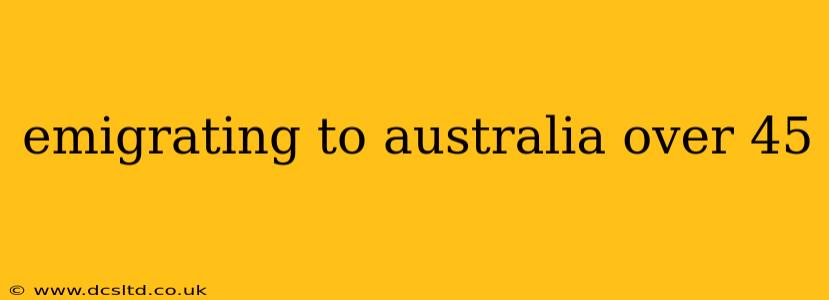Emigrating to Australia after the age of 45 presents a unique set of challenges and opportunities. While the younger generation often enjoys an easier path to skilled migration, it's certainly not impossible to make the move later in life. This guide explores the pathways available, the considerations you should make, and answers common questions about emigrating to Australia over 45.
What are the Visa Options for People Over 45 Emigrating to Australia?
Australia's immigration system is points-based, meaning potential migrants are assessed based on factors like age, skills, qualifications, and work experience. While age is a factor, it's not a disqualifier. Several visa options cater to those over 45, although the points awarded for age will be lower than for younger applicants. The most common pathways include:
- Skilled Independent Visa (Subclass 189): This visa is for skilled workers who can meet the points threshold and have an occupation on the skilled occupation list. While age affects your points score, having highly sought-after skills and extensive experience can compensate.
- Skilled Nominated Visa (Subclass 190): This visa requires sponsorship from a state or territory government. Each state has its own nomination criteria, and some might be more welcoming to older applicants with specific skills in high demand within their region.
- Skilled Work Regional (Provisional) Visa (Subclass 491): This visa requires sponsorship from either a state or territory government or an eligible family member residing in a designated regional area. It allows you to live and work in a regional area for 3 years, and can lead to permanent residency.
- Employer Sponsorship: Securing a job offer from an Australian employer who is willing to sponsor your visa is a strong pathway to permanent residency, regardless of age. This often requires a high level of skills and experience.
- Investor Visas: If you have significant financial resources, investor visas offer a route to Australian residency. These visas typically require a substantial investment in Australian businesses or government bonds.
How Do Points-Based Immigration Systems Work for Older Applicants?
Australia's points-based system awards points across various categories, including age, skills, work experience, English language proficiency, and qualifications. While those under 45 generally receive higher points for age, older applicants can compensate by achieving high scores in other categories. This means showcasing strong skills, qualifications, and significant work experience becomes paramount. A comprehensive skills assessment is crucial to determine your eligibility and potential points score.
What are the Most In-Demand Skills and Occupations for People Over 45?
The demand for skilled workers varies, but occupations in healthcare (doctors, nurses, specialists), IT, engineering, and trades often have high demand. Australia is also experiencing a skills shortage in many regional areas, making those regions potentially more welcoming to older, skilled migrants. Researching current skills shortages within specific states and territories can significantly improve your chances.
What are the Health Requirements for Migrating to Australia?
Australia has health requirements for all visa applicants. Applicants over 45 may undergo more rigorous health assessments than younger applicants. It's crucial to be aware of these requirements and to ensure you meet the necessary health standards. Pre-existing health conditions may not automatically disqualify you, but they might necessitate further medical examinations.
How Can I Increase My Chances of Success in Applying for an Australian Visa Over 45?
- Highlight transferable skills: Emphasize your skills and experience that are relevant to the Australian job market.
- Improve your English: High English language proficiency scores are essential.
- Seek professional help: Immigration lawyers and agents can provide valuable guidance and support throughout the application process.
- Network: Connect with people already living in Australia to gain insights and potential job leads.
- Target regional areas: Consider applying for visas that allow you to live and work in regional areas, as these often have less competition.
Emigrating to Australia after 45 requires careful planning and preparation. By focusing on your strengths, showcasing your skills, and addressing the unique challenges, you can significantly increase your chances of success in building a new life Down Under. Remember, thorough research and professional guidance are key to navigating the immigration process effectively.
